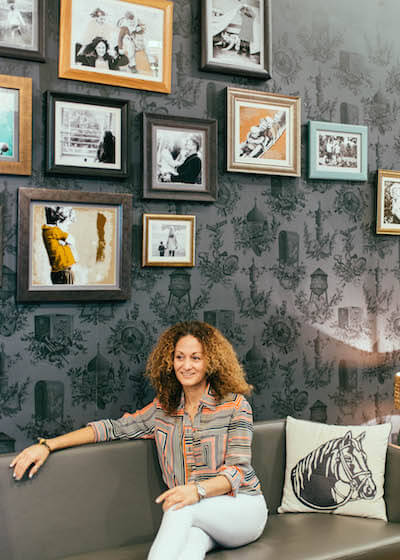I wouldn’t call myself a messy person, but when I look at the piles of winter clothes and snow boots stashed in plain view of my closet, I know it’s time to store them away and make room for my spring wardrobe. But easier said than done, right?
For a little Organization 101, I turned to DwellWell’s Stacey Platt, author of What’s a Disorganized Person to Do? The WeWork Soho West member talked with me about being “born with organizing genes.” She also discussed dealing with physical and digital clutter, sharing her quick tips that you can try immediately.
How did you get into organizing? I read somewhere that you lined up your records and games perfectly as a child.
I would say it was kind of accidental. My mom was really organized. You might think I would have rebelled from that kind of situation. I must have been born with organizing genes. This came about at a certain point in my life when I just finished business school and I got a job as a consultant in a human resources firm, which I really didn’t like. I left in a time when the economy was in a place where you could leave a job and be confident that you can get a new one.
I had gotten into yoga, so I wanted to find something that would enable me to be able to practice yoga every morning and go to India for extended periods of time every year. I knew I had to work for myself, and I really didn’t know what I would be doing. But a friend mentioned that she knew somebody who helped people get organized, and a light bulb went off for me. I took out an ad in the back of New York magazine that said, “Get organized. Free consultation.”
I kind of just jumped into it like that. This was always a side gig, until there came a point in 2007 when I thought I was going to retire from the organizing business and focus on teaching yoga and life coaching instead. Then a book deal fell in my lap on organizing. Once I published the book, there was a whole snowball effect. Next thing I know, I had a business partner and an employee.

Now that you’ve been doing this for a little less than two decades, how would you describe your organization philosophy?
I’m a believer that less is more. Having too much stuff, it impedes your ability to find what you need and you lose money because it’s pushed to the back of your cabinet. I believe in the “one in, one out” rule. You buy something, and then you get rid of something. When it comes to your home, you need to eliminate. My philosophy is: spend your money on experiences that bring you joy.
What’s the best way to start decluttering? How do you prevent your clients from feeling overwhelmed?
To prevent the feeling of being overwhelmed is to focus on one area at a time. Don’t think about doing the whole house at once. Some people like to pick something like a problem spot, but it’s not the worst spot. The first step when you’re organizing anything is to take everything out and sort like items together. You need to start with a blank slate. Purge whatever you don’t need.

What have been some of the most dramatic transformations you’ve seen in people’s lives as a byproduct of them eliminating clutter?
Well, I had a client who moved out of her five-story townhouse where she had lived for 35 years. She raised her family there and lost her husband there. Even though she had a really beautiful house, all of her closets, cabinets, and shelves were stuffed to the gills. We got rid of about 15 truckloads of garbage bags. It was stuff she had been living with over the years. Anyway, I saw her six months later, and she lost 30 pounds.
There is a direct correlation with weight and clutter. Well what I’m about to say is pretty sensitive. Clutter kind of serves the same purpose as weight. Psychologically speaking, some people gain weight to keep the world away a bit. It’s like a layer of protection between them and everything outside them. Clutter is the same thing, and if you take that to the extreme, like if you look at hoarders, they literally put so much stuff around them so that they can’t even have people come over. It’s a way to keep people away. That’s an example of the extreme.

Since we discussed physical clutter, what would your advice be for people dealing with digital clutter?
I think the flood of emails we get everyday overwhelms us all. It tends to serve as our to-do list. And the more that’s there, the more overwhelmed we feel. I think a big part of spring cleaning your office is to clean your digital life. Delete emails, empty your computer trash, run a defragmentation of your hard drive to optimize performance. Unsubscribe from emails that you don’t really care about or set up filters, so if you do like to receive your shopping newsletters, it can get funneled into a folder that you can look at later.
Are there books or ideas or people who have influenced you?
My business has actually become an amazing launch pad for me to return to some of my more spiritual roots with working with people one-on-one on a coaching aspect. I studied shamanism for a few years now and the way I bring it into my job is through “space clearing”—helping people shift the energy in their home office to get whatever results they’re looking for. When you make space in your physical environment, you’re also creating mental space and a feeling of freedom.
Photos: Katelyn Perry




